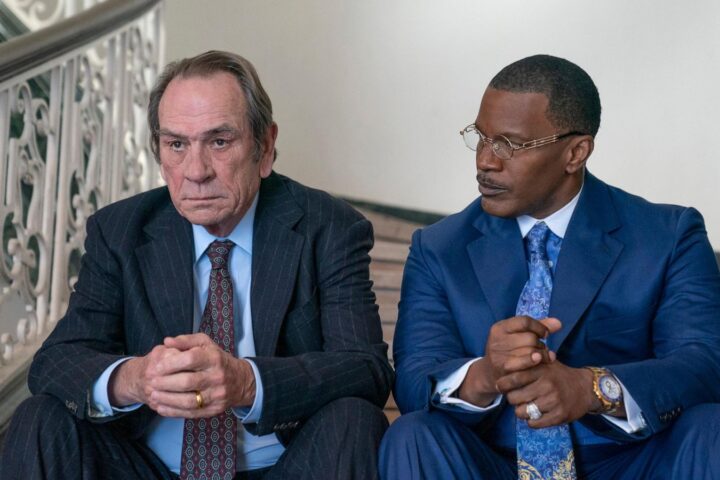Bradley Cooper’s Maestro opens presumptuously with a quote that Leonard Bernstein uttered during a lecture he gave at Harvard University in 1976: “A work of art does not answer questions, it provokes them; and its essential meaning is in the tension between the contradictory answers.” To some degree, the quote encapsulates Cooper and co-writer Josh Singer’s mosaic-like method in attempting to capture Bernstein as a human being—one that lays the man’s contradictions bare without overt psychologizing. It also, though, inevitably raises the question of whether Cooper’s film approaches the breadth and majesty of its subject.
Maybe no biopic, however sensitively done, can come close to encompassing the entirety of Bernstein’s life. This was a man so filled with passion for music in all its forms that he couldn’t help but let it out not only in the music he composed, but also on the podium as a conductor and throughout his teaching. But Cooper’s failure to come up with a film that does such a charismatic, mercurial, and complicated figure full justice is especially disappointing. With Maestro, he’s essentially reduced Bernstein’s boundary-pushing life and legacy to the sum total of its most accessible (read: audience-friendly) elements: his interpersonal relationships.
To that end, Cooper mostly relegates Bernstein’s art to the sidelines, perhaps on the assumption that his accomplishments are already widely known. Thus, we only get quick mentions of classics like West Side Story and Candide, as well as brief flashes of Bernstein (Cooper) in the process of composing his score for the 1944 ballet Fancy Free and his controversial Mass from 1971. And the only dramatizations of his conducting side come through a couple meticulous recreations of his live concerts, including his 1973 performance of Gustav Mahler’s “Resurrection” Symphony with the London Symphony Orchestra in Ely Cathedral. (Bernstein’s pivotal role in popularizing Mahler’s music through his Sony recordings in the 1960s is among many aspects of his artistic legacy that goes unmentioned in the film.)
Instead, Maestro focuses primarily on the relationship between Bernstein and Chilean actress Felicia Montealegre (Carey Mulligan), who we see during their initial encounter at a party in 1946 to their courtship and eventual marriage up to her untimely death from lung cancer in 1978. The film’s drama revolves around the ups and downs of that relationship—principally, how the devoted Felicia put up with her husband’s frequent dalliances with other men, even at one point going so far as to flirt with an extramarital affair of her own. Maestro, then, is pitched as basically a love story, with Felicia the prototypical long-suffering wife who cares even more for her husband’s creative and emotional well-being than even Lenny himself does.
Early on in the film, Cooper indulges in one bit of stylistic playfulness, in which a dream ballet sprouts out of a performance of Fancy Free featuring Bernstein himself in full sailor garb romancing Felicia. Other than that, a couple of imaginative transitions (courtesy of editor Michelle Tesoro), and Cooper’s decision to switch between color and black and white and 16:9 and 4:3 aspect ratios, Maestro treats their relationship with the seriousness of an Edward Albee play. Tense exchanges and explosive arguments frequently play out in long takes and wide shots under cinematographer Matthew Libatique’s clinically observant gaze, as if Cooper expected the essences of these two people to bleed out from underneath the elegant, naturalistic surfaces.
That would require material and actors sensitive to the kinds of gestures and nuances that people trying to suppress their inner emotions often betray physically or vocally. Instead, Maestro’s script has the characters verbalize their psychologies and philosophies to us. Even if they were drawn from the historical record, moments like Bernstein saying “Sometimes I can’t seem to find myself” or Felicia explaining how much her husband needs to be around his friends all the time simply seem heavy-handed in this context. And Cooper’s attempts at visual “poetry” are sometimes outright embarrassing, such as the unintentionally hilarious way he uses Snoopy as a metaphorical bookend to an emotionally annihilating argument between Lenny and Felicia.
Of the two central performers, Mulligan—who essentially takes over the film’s last third as Felicia declines in health after her cancer diagnosis—fares better, imbuing her character with a convincing mix of romantic vulnerability and steely inner resolve. Cooper certainly nails Bernstein’s vocal and physical tics, but even when he’s basically doing a decent job aping the composer’s impassioned gyrations during that aforementioned live Mahler “Resurrection” climax, he rarely feels like he’s truly inhabiting the man, merely imitating him virtuosically.
But, then, there’s so little to discover about Bernstein here considering the kid-glove treatment that Cooper has given him on screen. If anything, Maestro is even worse than other conventional biopics, since, by leaving so much of Bernstein’s actual artistic achievements unacknowledged, it barely gives the uninitiated a clue as to why he’s so significant in the first place. Such a fundamental failing on Maestro’s part may well lead one to the broader conclusion that perhaps not all Great Men need to have biopics made about them.
Since 2001, we've brought you uncompromising, candid takes on the world of film, music, television, video games, theater, and more. Independently owned and operated publications like Slant have been hit hard in recent years, but we’re committed to keeping our content free and accessible—meaning no paywalls or fees.
If you like what we do, please consider subscribing to our Patreon or making a donation.







Well, the movie is lost on you sadly, as it’s not a biopic; rather, it’s a complicated love story that fed Bernstein’s musical and personal dalliances.
No one film can capture the magnificence that was Leonard Bernstein. Conductor, composer, director, poet, professor, and complicated human: that’s a brief summation of Bernstein.
The film explicitly focused on his relationship with his wife. Maybe other film makers will take up the challenge to make a film focusing on Bernstein’s musical career.
Outstanding review! I agree wholeheartedly. I wanted to see the depths of Bernstein’s genius. Didn’t get to. It was surface, easy pickings-trendy subject matter. It’s so much easier to go for the razzle dazzle of overt behavior, rather than probe into the unknown realm of artistic creation and inspiration. Well done!
How may I stay on your radar? I am a writer/performer/stand-up comic/actor/musician.
Excellent review. Agree with (almost) every word. Such a missed opportunity.